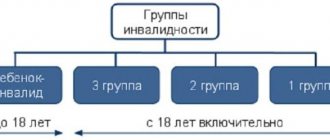Disabled person: who is considered as such by law
A disabled person may be considered a person who has a permanent health disorder resulting from illness or injury, which results in the need for social support.
A disabled person cannot take care of himself fully or partially. Depending on the disability group, a person either completely needs outside help, or can meet his needs, but needs additional help.
To obtain the status of a disabled person, a citizen must apply to a special commission, bringing with him a number of documents confirming the impairment of health.
In what case can a disabled spouse receive alimony during a divorce?
During a divorce, one of the spouses has the right to legally claim alimony if a difficult financial situation is added to his disability.
A person receives the status of a disabled person of groups 1, 2, 3 in accordance with Law No. 181-FZ, if he is disabled, has health problems, restrictions in normal life activities due to illnesses, injuries and mutilations (both congenital and acquired) . To obtain a disability group, you must undergo a medical examination and become the owner of a medical certificate and a special certificate.
People with disabilities and in need of social protection, in some cases, can count on receiving alimony payments.
Grounds for a disabled person to receive alimony:
- difficult financial situation;
- disability group received before the official divorce;
- disability that occurred within a year from the date of divorce.
The legislation does not provide for a clear formulation of the ex-spouse’s need, so he must provide evidence of it. For the court, the income and expenditure parts of the plaintiff’s budget are calculated so that the court can study the facts indicating his difficult financial situation.
Such arguments include:
- sources of income, their amount, frequency of receipts;
- proportionality of income and expenses;
- the presence of joint minor children, indicating their place of residence and method of support;
- lack of financial support from outside;
- other circumstances (disease requiring expensive treatment, etc.).
During divorce proceedings, women are interested in whether the wife should pay alimony to her disabled husband, or whether only the man is obliged to pay funds for the maintenance of his disabled wife.
The law establishes that both the ex-wife and the ex-husband can claim alimony. To do this, the claimant must provide evidence that he is in need and be disabled.
Should a disabled person pay child support for his child?
The obligation to provide for their minor child lies with each parent, without exception.
The presence of disability does not relieve a person from this obligation. A pension, including a disability pension, is one of the payments from which alimony can be recovered. The list is determined by Decree of the Government of the Russian Federation No. 841 of July 18, 1996. Subparagraph “a” of paragraph 2 states that alimony is levied on all types of pensions, and subparagraph “c” - on temporary disability benefits.
A disabled person can pay alimony voluntarily, on the basis of an oral agreement or an agreement certified by a notary, or in accordance with a judicial act.
Group 1 disability
A disabled person of the first group most of all requires additional social support. This status is assigned only in the presence of certain diseases, the list of which is also specified in a separate act.
A disabled person in this group is not able to provide even for their own needs. He cannot provide for himself at home, and accordingly, he has the highest payments from the state among other disabled people.
This does not relieve such a person from alimony obligations. The recipient of alimony has the right to go to court and receive payments from the disabled person’s pension. At the same time, a disabled person has a real opportunity to reduce the amount of payments, depending on his actual condition. The court will carefully examine all the circumstances and determine the size.
Disability 2 groups
A disabled person of the second group cannot work (except in rare cases), but can already provide for his basic household needs.
Such a person also has obligations to support and provide for the needs of his children. The legislator considered that the condition of the parents cannot be the reason why minors find themselves without their help.
Payments are made from the pension. If a disabled person conducts labor or entrepreneurial activities, then additional penalties are made from this type of income.
Disability 3 groups
The third group is considered to be workers, that is, a person who has been assigned this status has the actual opportunity to work and earn additional money. The state only provides additional support to such a citizen in the form of payments and preferential working conditions.
Such persons with disabilities must also bear their child support obligations. In this case, alimony can be collected from both pensions and wages.
Exemption from paying maintenance for a disabled person
According to Article 120 of the RF IC, there are several grounds on which one can obtain an exemption from paying alimony for the maintenance of a disabled person:
- death of one of those involved in the transaction;
- for the reasons specified in the alimony agreement;
- the disabled child is 18 years old;
- restoration of working capacity of a disabled person (relative, adult child, ex-wife);
- adoption of a child for whom alimony payments were intended for the maintenance of a disabled person;
- the remarriage of a former disabled spouse who received money.
Options for collecting child support from a disabled parent
Alimony can be collected from a disabled person in one of the following ways:
- voluntarily, based on an oral agreement. In this case, it is recommended that each payment be accompanied by a financial document confirming it. At a minimum, this should be a receipt;
- on the basis of a notarized agreement;
- on the basis of a judicial act.
In this case, actual collection can also be made in different ways:
- the recipient sends the judicial act or notarial agreement to the bailiff service at the debtor’s place of residence. Bailiffs search for income;
- the executive document is sent to the Pension Fund or to the place of work of the disabled parent, if he is working.
If there are several sources of income from which collections will be made, then it is better to send the document to the FSSP in order to make collections from everyone at once.
Settlement agreement
The parties may enter into an agreement to collect alimony on a voluntary basis.
Such a document must be certified by a notary. The document may contain different procedures for calculating payments:
- as a percentage of the payer’s income;
- in a fixed amount.
Subsequently, the agreement can be used as an executive document and sent to the Pension Fund or the bailiff service.
Judicial order
If an agreement cannot be reached, the potential recipient may go to court. As a general rule, the recipient submits an application for an order to recover the amounts as a percentage. The payer can cancel the order, then collection will be made within the framework of the claim.
The payer may try to reduce the amount of payments if he proves that there are circumstances for this, for example, if he requires ongoing expensive treatment.
Methods of paying alimony for the maintenance of a disabled person
There are two options for transferring alimony for the maintenance of a disabled person: child, spouse or parents. Namely:
- voluntary - an agreement is concluded between the interested parties on the payment of alimony for the maintenance of an incapacitated citizen and certified by a notary;
- forcibly - the initiating party submits an application to the court with a demand to recover alimony from the spouse (son, daughter), if it was not possible to reach an agreement peacefully.
If in the first case the parties can independently choose for themselves a convenient form and frequency of mutual settlements of alimony payments for the maintenance of a disabled person (clause 1 of Article 104 of the RF IC), then in the second option it is possible for the court to assign monthly payments in shares of the salary of the alimony obligee, a fixed monetary amount amount or in a mixed way (clause 2 of article 104 of the RF IC).
Amount of child support payments from a disabled parent
The amount of alimony is determined either by agreement or by a judicial act. As a general rule, one child receives a quarter of the income, two children receive a third, and three or more receive half. However, the size may vary depending on the circumstances.
Percentage of payments from salary
Often a disabled person has not only a pension, but also a salary. In practice it is common for it to have a third group. The percentage of penalties in this case will be normal - depending on the number of children.
What percentage is withheld from a disability pension?
A standard percentage is collected from the disability pension as alimony payments. The payer only has the opportunity to reduce payments through the court if he can prove such a need.
Cases when increased alimony is due
The recipient may also try to increase the amount of child support. This is possible when a child requires additional funds, for example, he needs long-term expensive treatment or care. The final decision is made by the court based on all factors relevant to the case.
Is it possible to reduce the amount of alimony?
The amount of alimony can be reduced only on the basis of a judicial act. This can be done immediately by filing a counterclaim for reduction within the framework of the case.
It is possible to initiate a separate civil process after the actual collection, but you must remember that it will no longer be possible to return previously paid alimony.
Reduction is only possible under certain circumstances. For example, if the payer has a serious illness and needs special care, and the funds available to him are not enough. It will not be possible to completely cancel alimony even in such a situation, since the court proceeds not only from the interests of the payer, but also from the interests of the child.
Is alimony calculated from a disability pension?
Decree of the Government of the Russian Federation No. 841 established a list of types of income from which alimony can be collected. These include all types of pensions.
Note!
Child support can be collected from a disability pension, both insurance, social or state.
An executive document obliging a disabled person to pay alimony - an agreement, a court order or a writ of execution - can be sent for collection directly to the Pension Fund branch at the payer’s location. The amount of alimony will be automatically written off and transferred to the recipient.
If the disability is removed
If the disability is lifted, the recovery will continue in the general manner, based on the existing decision. The recipient will be able to perform several actions:
- review the amount of payments if they were reduced based on the payer’s health status;
- send the writ of execution to another body or to the payer’s place of work, if previously collections were made through the Pension Fund of Russia;
- contact the bailiff service or the court with a request to recalculate alimony based on the average salary in the region, if the payer does not have official employment;
- go to court with a demand to collect payments in a fixed amount.
As a rule, further collections are made in the standard manner, but from other sources of income.
Alimony is mandatory. Parents must provide for their minor children even if they have a disability. This status can be used to slightly reduce payments, but not to completely cancel them, which is impossible in practice.
Collection procedure
In order to enforce alimony, you must apply to the district court. Compose your application and attach a package of necessary documents. First of all, a marriage or divorce certificate, a child’s birth certificate and an extract from the house register. It must indicate that the minor child lives with his mother.
If there are difficulties in establishing the place of residence and work, you can ask the court to set alimony in a fixed amount.
When a disabled person fails to collect alimony
Situations when a disabled former spouse may be denied alimony are described in Article 92 of the RF IC.
Reasons for refusals:
- receiving disability as a result of one's own careless actions (drinking alcohol, taking drugs, deliberately committed offenses or crimes);
- antisocial lifestyle;
- committing violent acts against a former spouse.
Collection of alimony for a disabled spouse is not made if the spouse against whom the claim is made has other dependents (young children in another marriage, elderly parents) or an outstanding loan/mortgage.
There will be no alimony obligations between spouses if:
- the registered marriage lasted less than 5 years;
- the disability group was obtained during the premarital period or a year after the divorce;
- the ex-husband is financially secure.
Let's look at an example. The disabled couple decided to divorce. A wife, a disabled person of the third group, brought a claim against her ex-husband for alimony in connection with her disability during marriage. The plaintiff indicated a difficult financial situation and the presence of a joint minor child in the upbringing and maintenance of which the father does not participate as the basis for collecting payments.
The applicant demanded to collect alimony in the amount of three subsistence minimums, but not less than 30 thousand rubles, since she did not have information about the defendant’s income. The court of first instance rejected the claims.
The plaintiff filed a complaint with the Court of Appeal, after which her claim was again denied.
Reasons for refusal:
- When collecting alimony from a former spouse, it is necessary to take into account whether he has sufficient income for this. This is required by Article 90 of the RF IC. The applicant did not provide evidence as to whether the ex-husband was able to pay the amount she demanded.
- Evidence that the father does not provide for or raise a minor child was also not provided.
- The plaintiff is registered as an individual entrepreneur, works and is able to provide for herself and her child.
- Having a third group of disability, the applicant has undergone individual rehabilitation and is able to do housework.
Conditions of receipt
The legislation does not strictly distinguish between disability groups when assigning alimony. The incapacity of a parent does not relieve him of his responsibilities to provide financial and other assistance to his child. Therefore, it does not matter what disability group a person has.
The main conditions for collecting maintenance are:
- the child has not reached the age of majority;
- the presence of a blood relationship between the disabled person and the child.
Adult children can also recover alimony from a disabled parent if they are declared disabled and in need of additional care (we talked in more detail about when persons over 18 years of age can apply for alimony in this article, and about the nuances and rules their collection, you will find out here).
When considering this type of case, the court examines all sources of income, pensions and benefits. The disability of an adult child must be documented by medical certificates and reports.
Divorce of parents cannot affect the child's legal right to receive child support.
Important! Deprivation of parental rights does not exempt you from paying alimony for the maintenance of your children.
How long will it take to pay alimony to a disabled spouse?
A plaintiff who has the first group of disability has the right to count on lifelong maintenance by the defendant, especially if the first group is established for an indefinite period. If there are other disability groups, if the ability to work is restored and the group is removed, the defendant has the right to file an application to terminate alimony payments.
If the spouse receiving alimony leads an antisocial lifestyle, the court may decide to cancel the payments.
In other cases, alimony must be paid in full and in compliance with payment deadlines. Failure to pay is a serious offense and will be prosecuted in accordance with the law.
Thus, an ex-husband or wife who has a disability group and is experiencing financial difficulties has the right to demand money from their former other half for their own maintenance. They can resolve this issue voluntarily with notarization of the document. If the parties do not reach a mutual agreement, they apply to the court to establish alimony liability.
What are the options
The main thing is that two factors come together: disability and need. The third group of disabilities are people with partial ability to work, that is, they do not formally meet the above criteria.
- This issue can be resolved through an agreement between the parties. Only then it must be certified by a notary.
- Through a court decision. In this case, the plaintiff will have to prepare a statement of claim and file it with the magistrate's court.
- A child who has reached the age of majority has the right to file a claim for child support from his parents. If the court proves that the child is incapacitated and has a difficult financial situation, the parents will be required to pay child support. If options 1 and 2 are fairly standard procedures and are used for healthy children and children with disabilities, then this option is an exception. Such a claim can also be filed by the child's guardian. The presence of various benefits, pensions, and income-generating property is not a reason for canceling alimony.
| Child support calculator | |
| How many children do you have under 18 years of age? | |
| Is the children's father officially employed? | |
| How much does the alimony payer receive? | rubles Error |
| The amount of other income of the alimony payer (for example, from renting out an apartment): | rubles Error |
| Alimony will range from 400 rubles to 13,000 rubles for each child. The judge will determine the exact size! If he is not registered with the employment center, then you need to file a claim and set alimony in a fixed amount. |
But a disabled person of group 3 can file a lawsuit if it is impossible to find a job that will not harm health and life in general. Disabled people of groups 1 and 2 clearly have the right to collect alimony from their parents.
Customer Reviews
Review by Gavrichkova A.N. I would like to express my deepest gratitude to Yuri Vladimirovich Sukhovarov for his humane attitude towards my problem and detailed professional advice on solving it. I wish I could meet such people in my life more often.
Sincerely, Gavrichkov Alexander Nikolaevich.
Gratitude to the team I express my gratitude to the legal team. department of St. Petersburg. for the service provided in terminating the loan agreement for the purchase of space. funds that I had the imprudence to enter into with one of the unscrupulous companies. The lawyers responded quickly, paid a visit to the company and filmed it. Once again I express my endless gratitude and wish you continued prosperity.
Gratitude from Elena and Alexander I sincerely thank lawyer Vasily Anatolyevich for his qualified and polite service. We will always contact you and tell our friends. Thank you.
Elena
Alexander 998-98-59
Gratitude from Bolotin V.S. I thank Alexander Viktorovich Pavlyuchenko for the work done as part of the investigation into the administrative case. I am especially grateful that almost all activities within the framework of the case were carried out by Alexander personally, without my involvement, which significantly saved my time. I would also like to note the efficiency with which the work was completed. I would like to wish Alexander further success in his professional activities and the successful completion of all current and subsequent cases, restoring justice to his clients.
Bolotin V.S., 02/12/2017
Letter of thanks
Gratitude from Gordeeva E.S. I express my special gratitude to Sergei Vyacheslavovich for his highly competent and detailed consultation on the issue of the employment contract.
Doctor of Philological Sciences, Gordeeva E.S. 12/01/2018
Gratitude from A.P. Sovenova and E.Ya. Komudina Dear lawyers!
Please accept our deep gratitude for your attention, professional approach and desire to help people. We especially want to highlight Dmitry Germanovich, Denis Yuryevich, Daria Valentinovna.
Best regards, A.P. Sovenov, E.Ya. Komudina
Customer Feedback We thank the employees of Legal Agency of St. Petersburg LLC and, first of all, Yana Maksimovna Matveeva and Andrey Valerievich Ermakov for their highly qualified and thorough consideration of our issue and the prompt solution to our housing problem.
Also to Daria Valentivna Kutuzov for her attentive and friendly attitude towards visitors.
Gratitude from V.N. Skorokhodova Dear Alexander Viktorovich! Let me express my sincere gratitude to you for your understanding, sensitive approach to the situation, openness, emotions and professionalism. I wish you good luck, success in your work and prosperity.
Sincerely, Skorokhodova V.N.
Gratitude to Sukhovarov I, Dmitry Vladimirovich Korchagin, express my gratitude and appreciation to lawyer Yuri Vladimirovich Sukhovarov for high-quality and qualified advice. Thank you.









